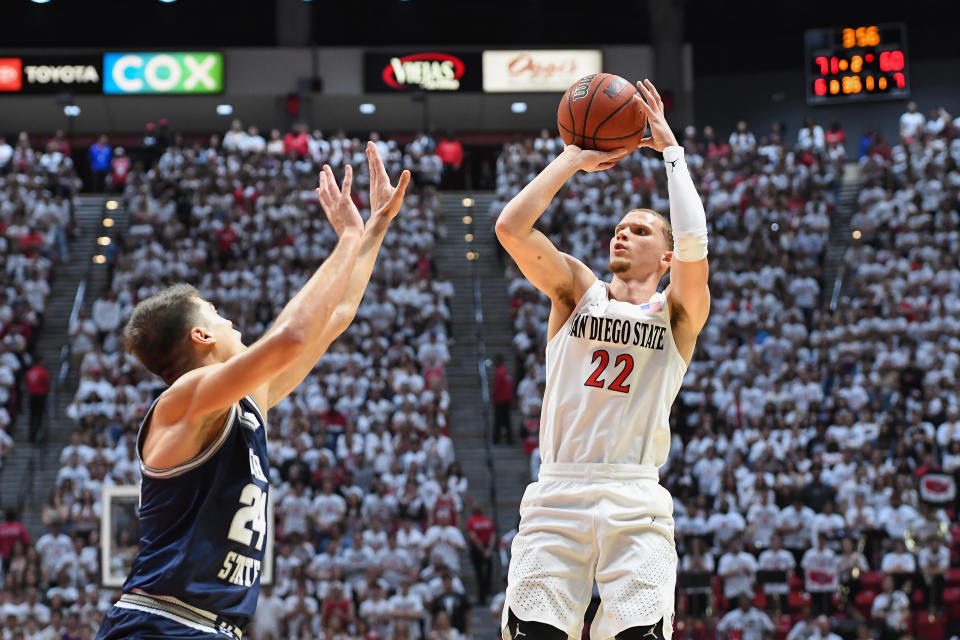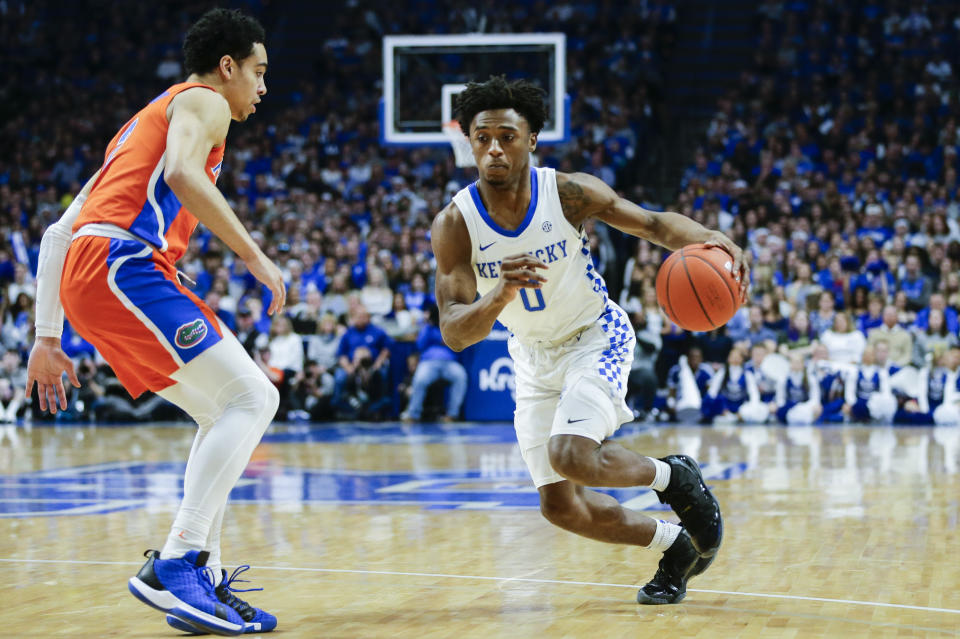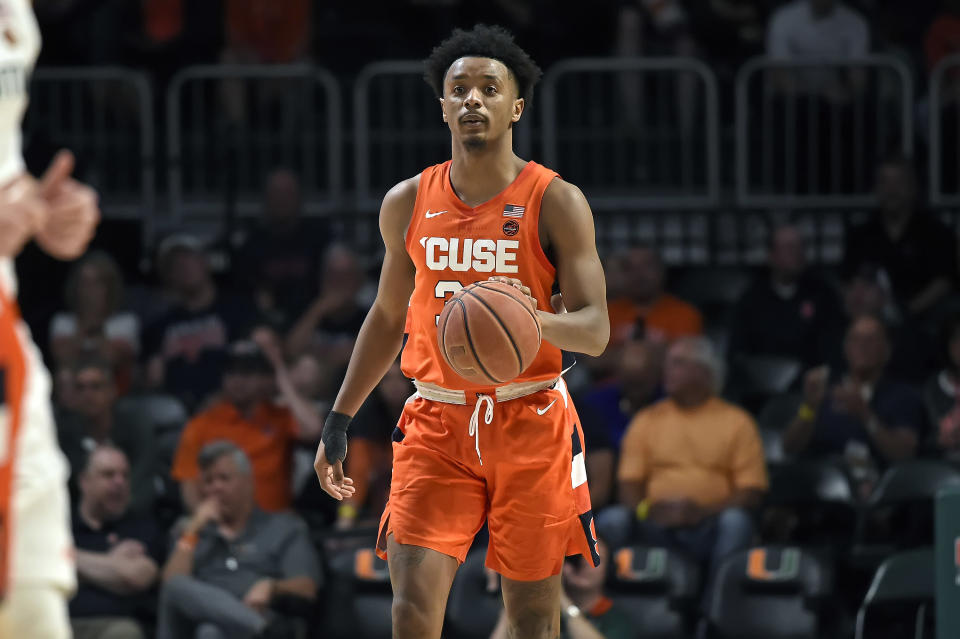NBA draft: Five potential second-round picks who could surprise
This year’s draft class is all over the place with no true overall No. 1 pick like Zion Williamson last year and a ton of question marks throughout the first and second rounds. Each year we see some sleepers emerge from the second round who go on to have successful NBA careers. Draymond Green, Nikola Jokic, DeAndre Jordan were second-round picks who have carved out great NBA careers. Going back even further, Dennis Rodman and Manu Ginobili were also picked in the second round, and you know all about their achievements.
In a unique year with no NCAA tournament and a global pandemic that stopped basketball for four months, players who would have boosted their draft stock in the postseason might fall to the second round. Point guard Malachi Flynn led San Diego State to one of its best seasons and had the potential to be a tournament star. Without that platform, NBA teams are left wondering how he would have fared against elite Power Five competition in the tournament.
Here is Flynn and four other prospects who could be second-round sleepers and flourish in the NBA.

PG Malachi Flynn
Junior
San Diego State
17.6 ppg, 4.5 rpg, 5.1 apg
Flynn led the Mountain West in assists and steals, and was third in scoring last season. San Diego State was a top-five team in the country for the majority of the season, thanks to Flynn and teammate Matt Mitchell. Flynn’s season high came in a win over Nevada with 36 points on 13-of-20 shooting. Flynn is a consistent shooter from deep and can get to the rim. He had a breakout year and showed NBA scouts he could score at all three levels and was efficient in the half-court set, shooting 42.5 percent from the field.
The 6-foot-1 point guard is a little bit older than most prospects at 22, but his shot mechanics are polished and he’s experienced, so he could see some early playing time.
G Cassius Stanley
Freshman
Duke
12.6 ppg, 4.9 rpg

No one could ever replace the hole Zion left at Duke, but Stanley managed to fill the void a little bit with his high-flying dunks and impressive plays in transition. He also managed to break the vertical leap record that Williamson set. The native of California chose Duke over UCLA, Oregon and Kansas and also played high school ball at Sierra Canyon in Los Angeles alongside Kenyon Martin Jr. and Scottie Pippen Jr.
Stanley excels in transition, scoring just under 100 points this season off turnovers and missed shots. In the half-court set, he did better as a spot-up shooter or off the pick-and-roll, making 50 percent of his shot attempts. His jumper still needs some work, as he shot 36 percent from 3-point range, but we’ve seen players like Stanley excel in the NBA and have long careers. Devin Booker came off the bench at Kentucky, averaging 10 points per game in his lone season, but now he’s an NBA All-Star. Kelly Oubre had a similar career at Kansas as a spot-up shooter, averaging 9.3 points per game. NBA teams recognize the potential of athletic, quick guards like Stanley and he could be a steal.
PG Ashton Hagans
Sophomore
Kentucky
11.5 ppg, 6.4 apg

Kentucky coach John Calipari believes Hagans was the best point guard in college basketball last season, telling reporters in December, “We can say there are better point guards in the country, but you have to tell me who you’re talking about.” Hagans was one of the best on-ball defenders in the country, forcing 58 steals, the second most in the SEC. He also led the conference in assists, averaging over six per game.
Hagans is excellent in iso situations, making 63 percent of his shots off the dribble in one-on-one matchups. He prefers playing downhill and likes to get to the rim or dish to a teammate. In catch-and-shoot situations, he only made nine of 33 attempts. Hagans is a true point guard who is athletic and can facilitate an offense, but in a point guard-heavy draft, he could fall. If Hagans can develop his outside shot, he might end up being one of the best players to come out of this draft.
SF Elijah Hughes
Junior
Syracuse
19 ppg, 4.9 rpg, 3.4 apg

The 6-foot-6 wing led the ACC in scoring during the shortened season. He transferred from East Carolina in 2017 after a disappointing season and has done nothing but improve under Hall of Fame coach Jim Boeheim.
Hughes has a complete game, hitting 78 3-pointers and shooting 42.6 percent from the field. Half of his points came from iso situations or spot-up jump shots, with only 18 percent of his total points coming in transition. What does Hughes bring to an NBA team? He’s older than most of his fellow draft prospects at 22, and in a draft with so much uncertainty, Hughes is one of the safer picks. A few years down the road, fans could be looking back wondering why Hughes was picked so late in the draft.
C Nick Richards
Junior
Kentucky
14 ppg, 7.8 rpg

Richards was one of the most improved players in college basketball. He averaged four points and 3.3 rebounds as a sophomore, but leaped to 14 points, 7.8 rebounds and 2.1 blocks per game this past season. Richards was a five-star recruit from New Jersey and was widely thought to be a one-and-done heading into his freshman year at Kentucky. He struggled to stay on the floor his first two seasons playing behind lottery pick PJ Washington.
Even though Richards is already 22 years old, there is still room for growth. This past season, according to Synergy Sports, Richards ranked in the 98th percentile offensively, scoring 431 points on 367 shooting possessions. Seventy-eight percent of his points came in the paint in post-ups, and the 6-foot-11 prospect shot 75.2 percent from the free-throw line. The modern-day NBA game caters to guards and playmakers, but teams still need bigs. The improvement Richards showed his junior year could be a springboard to his NBA potential.
More from Yahoo Sports:

